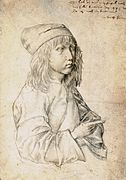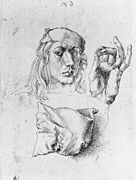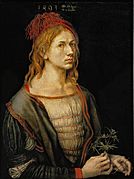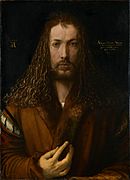Self-Portrait (Dürer, Madrid) facts for kids
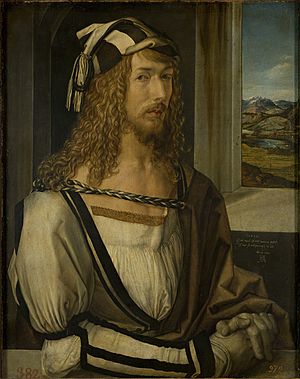
The Self-portrait (also known as Self-portrait at 26) is a famous painting by Albrecht Dürer. He painted it in 1498, after a trip to Italy. This is the second of three self-portraits Dürer painted of himself. In this artwork, Dürer shows himself as an important artist, someone who believed in his own talent. He is shown from the waist up, looking straight at you. He has a confident look, showing he was a young artist at the top of his game. He fills up most of the painting, from his hat that almost touches the top to his arm resting on the bottom edge. His fingers are covered by fancy gloves.
This painting was once displayed with another one, Portrait of Dürer's Father at 70. Today, the Self-portrait is kept at the Museo del Prado in Madrid, Spain.
What the Painting Shows
Dürer is painted in front of an open window. Outside, you can see a calm landscape with a lake and snowy mountains far away. This view might be a memory from his travels or a way to show his thoughts. Light comes in from the window, shining on his head and showing his soft skin and long, blonde hair.
Dürer is wearing stylish and fancy clothes, which shows the influence of Italian fashion at the time. He has a soft linen shirt with a low neck, decorated with gold trim. Over this, he wears an open jacket and a cloak tied over one shoulder. His white jacket has a black lining. His hands are crossed and hidden inside silk gloves. This was a bit unusual for Dürer. He often paid close attention to hands in his paintings, usually showing them holding something like a pillow, a rosary, or a flower. He looks out at the viewer with a cool, calm stare.
Other Self-Portraits by Dürer
-
Portrait of the Artist Holding a Thistle. This painting is in the Musée du Louvre, Paris.
See also
 In Spanish: Autorretrato de Durero (Prado) para niños
In Spanish: Autorretrato de Durero (Prado) para niños
- List of paintings by Albrecht Dürer
- 100 Great Paintings


